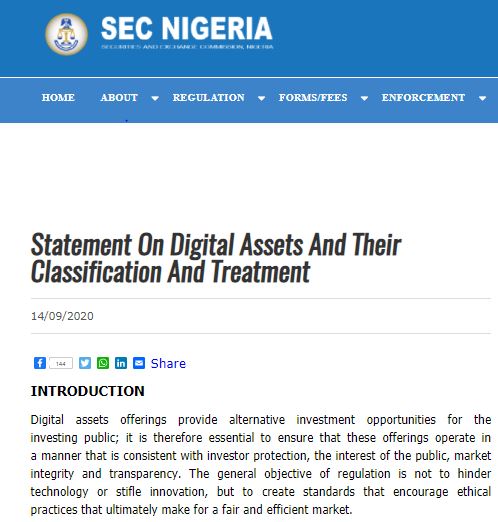The regulatory institution for the Nigerian capital market, the Securities and Exchange Commission (SEC) has just announced a new set of regulations to guide the issuance, custody and exchange of digital assets like Bitcoin and Ethereum.
According to a statement on its website, the new set of regulations will cover the “issuance, offering platforms and custody of digital assets” for virtual technologies. By our analysis, the regulations are quite comprehensive and cover basic concerns around crypto transactions.
The new set of guidelines is coming 20 months after the Commission first issued a statement on the classification and treatment of digital assets.
A summary of the regulation
Under the new SEC regulations, companies and entities looking to offer crypto products and services to Nigerians must secure a virtual asset service provider (VASP) license in addition to other relevant category licenses.
Similarly, the regulation stipulates that all crypto exchanges are now required to secure a permit which gives SEC access to its records. Plus, they are expected to submit weekly/monthly trading information and also quarterly/annual financial and compliance reports.
Another interesting note in the regulation is that projects looking to conduct initial coin offerings (ICOs) in Nigeria have to register with the SEC by filing an assessment form and submitting a detailed copy of its whitepaper. Then, the commission can allow a raise of up to 10 billion Naira. And, the SEC may adjust the figure from time to time.


In addition, the SEC has also set out a list of obligations related to operating a Digital Assets Offering Platform (DAOP). This refers to portals where issuers can launch an ICO.
According to the new regulation, a DAOP operator must provide the updated information about projects it lists to the investors. The operator must also monitor funds by projects to ensure that they are used for intended purposes. It must also conduct a due diligence exercise on any project looking to offer digital assets through its platform and exercise its own judgment on whether the project is fit to raise funds.
Also read: Here is How Nigeria’s SEC Plans to Regulate Cryptocurrencies, BlockChain Companies
What this means…
SEC last released a regulatory framework on cryptocurrencies in September 2020. The guidelines at that time took a three-pronged approach to regulating innovation in the crypto sector: safety, market deepening, and providing solutions to problems.
The old regulation established that all blockchain-based digital assets offerings within Nigeria including Digital Assets Token Offering (DATOs), Initial Coin Offerings (ICOs) and Security Token ICOs issued by Nationals or foreign sponsors will henceforth be regulated by the Commission.


The aim of the SEC 2020 guidelines was to protect investors and create standards for ethical practices while the latest one released on creates roles for different players in the Nigerian digital asset space. The bid is to improve the legal credibility and transparency of cryptocurrency transactions in Nigeria, in line with its objectives for regulating the sector.
This is in the light of the fact that many Nigerians have been defrauded by virtual currency scams posing as legitimate crypto platforms.
Also read: How to know if an investment option is a fraud scheme
In addition, the new rules from the SEC are coming in the midst of controversies and uncertainties regarding the acceptability of cryptocurrencies in the Nigerian financial ecosystem.
SEC’s stance is in direct contrast with the country’s Central Bank which fined some commercial banks for engaging in cryptocurrency transactions in April.
Just that you know, the ban by the Central Bank of Nigeria led to a rise in peer-to-peer trading. According to Paxful, the world’s largest bitcoin p2p marketplace, Nigeria accounts for the largest volume of cryptocurrency transactions outside the U.S between 2020 and 2021.
This recent development is a pointer to the fact that Africa’s most populous country is struggling to find a balance between ignoring the burgeoning technology and embracing it. Just last week, a CBN official disclosed that there are plans to upgrade the use case of eNaira to include bill payment options.
Going Forward…
From now on, the SEC’s new rules will help give more regulatory lucidity and clarity to the crypto sector. Analysts believe that this will bring legitimacy to the young space and help boost the rate of adoption as well as extend the frontiers of crypto use in Nigeria.
It is believed that the new rules would also go a long way in providing a useful framework with which Nigerian financial institutions may interact and relate with crypto whenever the Central Bank is ready to relax its hard stance.
You can download the new document here.






